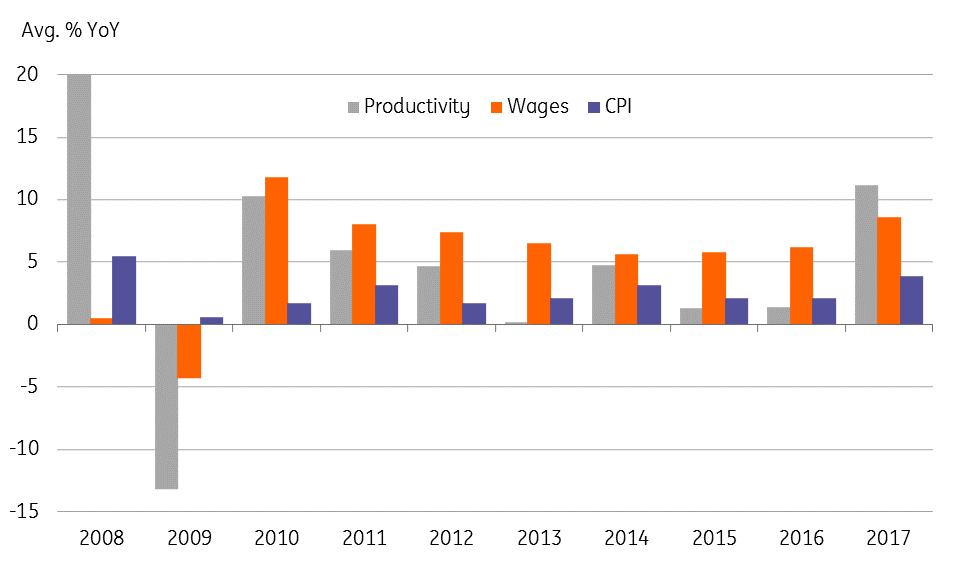Malaysia: Noisy January activity data
We reiterate our view of a gradual normalisation of Bank Negara monetary policy this year with one more 25bp interest rate hike in the third quarter
Noisy January data
Malaysia’s industrial production grew by a slower-than-expected 3.0% year-on-year in January. This was little changed from the 2.9% rate recorded in December and contrasts with an acceleration in exports volume growth (17.4% vs. 3.0%) and manufacturing sales growth (10.8% vs. 9.4%), reflecting strong demand for both. Growth of manufacturing salaries and wages hit an eight-month high of 13.3% (prior 9.2%), whereas employment growth edged up to 2.5% (prior 2.4%). Productivity growth, or growth of sales per employee, also improved to 8.0% (prior 6.8%).
January activity growth is noisy due to the timing of the Lunar New Year holiday, which fell in January in 2017 but in February this year. The combined January-February activity growth will provide an undistorted picture. For now, suffice it to say, based on sales, wages and employment growth, manufacturing continues to support GDP growth in 2018. Strong wage growth underpins private consumption, which remains the key expenditure-side GDP driver.
| 13% |
Wage growth (an eight-month high)Year-on-year |
Tight labour market
The tight labour market- with wage growth outpacing productivity growth since September 2017- could be potentially inflationary. Or, it may not be. 2017 was the first year in almost a decade in which average annual wage growth slowed below productivity growth and yet inflation accelerated (see chart). This shows that the supply-side push to prices, especially in food and fuel sectors, are more dominant than demand-side pressures in driving Malaysia’s inflation. Absent any supply shock to food prices or an oil price shock to fuel prices, consumer price inflation will not be a policy worry this year, in our view.
That said, we reiterate our view of a gradual normalisation of Bank Negara monetary policy this year with one more 25bp interest rate hike in the third quarter, once the political uncertainty associated with general elections in August this year lifts.
Productivity, wages and inflation

Download
Download article
14 March 2018
Good MornING Asia - 14 March 2018 This bundle contains {bundle_entries}{/bundle_entries} articles"THINK Outside" is a collection of specially commissioned content from third-party sources, such as economic think-tanks and academic institutions, that ING deems reliable and from non-research departments within ING. ING Bank N.V. ("ING") uses these sources to expand the range of opinions you can find on the THINK website. Some of these sources are not the property of or managed by ING, and therefore ING cannot always guarantee the correctness, completeness, actuality and quality of such sources, nor the availability at any given time of the data and information provided, and ING cannot accept any liability in this respect, insofar as this is permissible pursuant to the applicable laws and regulations.
This publication does not necessarily reflect the ING house view. This publication has been prepared solely for information purposes without regard to any particular user's investment objectives, financial situation, or means. The information in the publication is not an investment recommendation and it is not investment, legal or tax advice or an offer or solicitation to purchase or sell any financial instrument. Reasonable care has been taken to ensure that this publication is not untrue or misleading when published, but ING does not represent that it is accurate or complete. ING does not accept any liability for any direct, indirect or consequential loss arising from any use of this publication. Unless otherwise stated, any views, forecasts, or estimates are solely those of the author(s), as of the date of the publication and are subject to change without notice.
The distribution of this publication may be restricted by law or regulation in different jurisdictions and persons into whose possession this publication comes should inform themselves about, and observe, such restrictions.
Copyright and database rights protection exists in this report and it may not be reproduced, distributed or published by any person for any purpose without the prior express consent of ING. All rights are reserved.
ING Bank N.V. is authorised by the Dutch Central Bank and supervised by the European Central Bank (ECB), the Dutch Central Bank (DNB) and the Dutch Authority for the Financial Markets (AFM). ING Bank N.V. is incorporated in the Netherlands (Trade Register no. 33031431 Amsterdam).